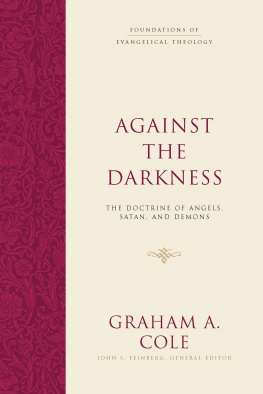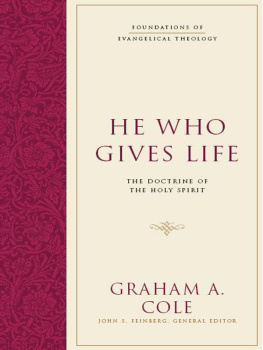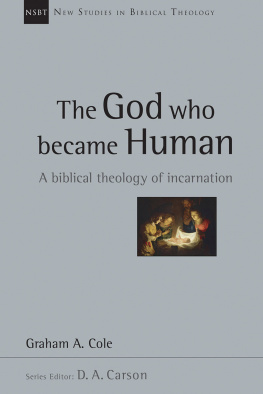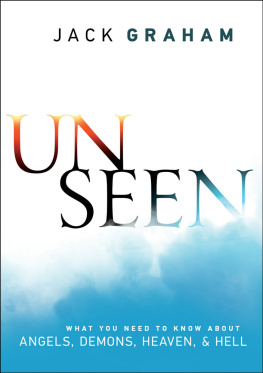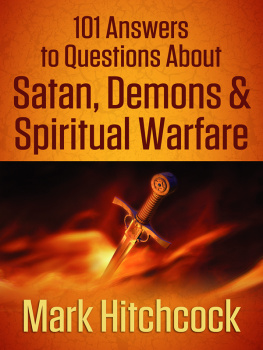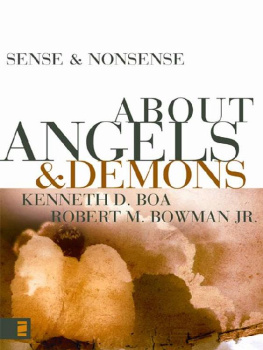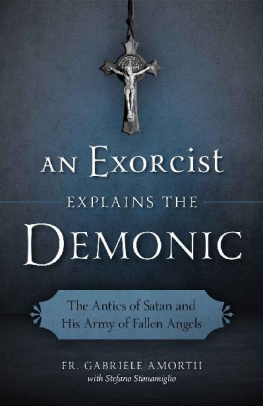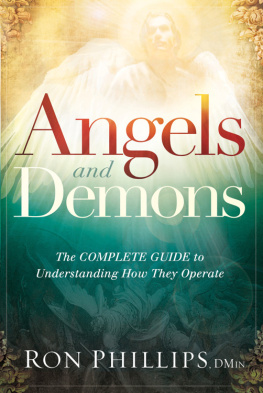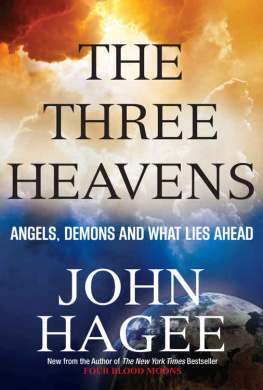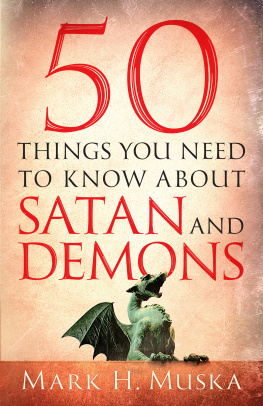Graham A. Cole - Against the Darkness: The Doctrine of Angels, Satan, and Demons
Here you can read online Graham A. Cole - Against the Darkness: The Doctrine of Angels, Satan, and Demons full text of the book (entire story) in english for free. Download pdf and epub, get meaning, cover and reviews about this ebook. year: 2019, publisher: Crossway, genre: Religion. Description of the work, (preface) as well as reviews are available. Best literature library LitArk.com created for fans of good reading and offers a wide selection of genres:
Romance novel
Science fiction
Adventure
Detective
Science
History
Home and family
Prose
Art
Politics
Computer
Non-fiction
Religion
Business
Children
Humor
Choose a favorite category and find really read worthwhile books. Enjoy immersion in the world of imagination, feel the emotions of the characters or learn something new for yourself, make an fascinating discovery.
- Book:Against the Darkness: The Doctrine of Angels, Satan, and Demons
- Author:
- Publisher:Crossway
- Genre:
- Year:2019
- Rating:4 / 5
- Favourites:Add to favourites
- Your mark:
- 80
- 1
- 2
- 3
- 4
- 5
Against the Darkness: The Doctrine of Angels, Satan, and Demons: summary, description and annotation
We offer to read an annotation, description, summary or preface (depends on what the author of the book "Against the Darkness: The Doctrine of Angels, Satan, and Demons" wrote himself). If you haven't found the necessary information about the book — write in the comments, we will try to find it.
Against the Darkness: The Doctrine of Angels, Satan, and Demons — read online for free the complete book (whole text) full work
Below is the text of the book, divided by pages. System saving the place of the last page read, allows you to conveniently read the book "Against the Darkness: The Doctrine of Angels, Satan, and Demons" online for free, without having to search again every time where you left off. Put a bookmark, and you can go to the page where you finished reading at any time.
Font size:
Interval:
Bookmark:
Foundations of Evangelical Theology Series
John S . Feinberg , General Editor
To Know and Love God: Method for Theology
David K . Clark
Light in a Dark Place: The Doctrine of Scripture
John S . Feinberg
No One Like Him: The Doctrine of God
John S . Feinberg
God the Son Incarnate: The Doctrine of Christ
Stephen J . Wellum
He Who Gives Life: The Doctrine of the Holy Spirit
Graham A . Cole
Against God and Nature: The Doctrine of Sin
Thomas H . McCall
Against the Darkness: The Doctrine of Angels, Satan, and Demons
Graham A . Cole
The Cross and Salvation: The Doctrine of Salvation
Bruce Demarest
Sojourners and Strangers: The Doctrine of the Church
Gregg R . Allison
Against the Darkness: The Doctrine of Angels, Satan, and Demons
Copyright 2019 by Graham A. Cole
Published by Crossway
1300 Crescent Street
Wheaton, Illinois 60187
All rights reserved. No part of this publication may be reproduced, stored in a retrieval system, or transmitted in any form by any means, electronic, mechanical, photocopy, recording, or otherwise, without the prior permission of the publisher, except as provided for by USA copyright law. Crossway is a registered trademark in the United States of America.
First printing 2019
Printed in the United States of America
Unless otherwise indicated, Scripture quotations are from the ESV Bible (The Holy Bible, English Standard Version), copyright 2001 by Crossway, a publishing ministry of Good News Publishers. Used by permission. All rights reserved.
Scripture references marked NIV are taken from The Holy Bible, New International Version, NIV. Copyright 1973, 1978, 1984, 2011 by Biblica, Inc. Used by permission. All rights reserved worldwide.
Scripture references marked NIV 1984 are taken from The Holy Bible, New International Version, NIV. Copyright 1973, 1978, 1984 by Biblica, Inc. Used by permission. All rights reserved worldwide.
Scripture references marked NRSV are from The New Revised Standard Version. Copyright 1989 by the Division of Christian Education of the National Council of the Churches of Christ in the U.S.A. Published by Thomas Nelson, Inc. Used by permission of the National Council of the Churches of Christ in the U.S.A.
All emphases in Scripture quotations have been added by the author.
Hardcover ISBN: 978-1-4335-3315-0
ePub ISBN: 978-1-4335-3318-1
PDF ISBN: 978-1-4335-3316-7
Mobipocket ISBN: 978-1-4335-3317-4
Library of Congress Cataloging-in-Publication Data
Names: Cole, Graham A. (Graham Arthur), 1949- author.
Title: Against the darkness: the doctrine of angels, satan, and demons / Graham A. Cole.
Description: Wheaton, Illinois : Crossway, [2019] | Series: Foundations of evangelical theology series | Includes bibliographical references and index.
Identifiers: LCCN 2018048953 (print) | LCCN 2018053994 (ebook) | ISBN 9781433533167 (pdf) | ISBN 9781433533174 (mobi) | ISBN 9781433533181 (epub) | ISBN 9781433533150 (hc : alk. paper) | ISBN 9781433533181 (ePub) | ISBN 9781433533174 (Mobipocket)
Subjects: LCSH: AngelsBiblical teaching. | DevilBiblical teaching. | DemonologyBiblical teaching. | Spiritual warfareBiblical teaching. | Theology, Doctrinal.
Classification: LCC BT963 (ebook) | LCC BT963 .C65 2019 (print) | DDC 235dc23
LC record available at https:// lccn .loc .gov /2018 8953
Crossway is a publishing ministry of Good News Publishers.
Chapter
Three
Barth. To be practical, we consider the implications of our findings for belief and practice, before drawing the threads together by way of a conclusion. An excursus follows dealing with angelophanies.
Angelic Activity on Earth
A time-honored way of doing theology is to state what is not the case ( via negativa ), before stating what is the case ( via positiva ). Barth does this in relation to angels when he argues,
Angels cannot, then, speak words which as their own are the words of God. They cannot do works which as their own are divine works. They cannot save, redeem or liberate the earthly creature. They cannot forgive even the smallest sin, or remove even the slightest pain. They can do nothing to bring about the reconciliation of the world with God. Nor are they judges of the world. They did not create it. They can neither be wrathful nor gracious toward it. They did not establish the covenant between God and man, and they cannot fulfil, maintain, renew or confirm it. They do not overcome death. They do not rule the history of salvation, or universal history, or any history. Otherwise they would not be the angels of God.
All this is admirably said, but it remains to ask what angels do, positively speaking, and to the positive witness of Scripture concerning angelic activity we now turn.
Bernard Ramm sums up angelic activity regarding the human sphere in terms of mediation. He argues,
The communication between this great God and finite, limited man must thus always be a mediated communication.
This is not a judgment about the impurity of the world, which would force God to communicate indirectly lest he contaminate himself with the world. It is based upon the transcendence of Creator over the creature. Therefore, when God comes to humanity in revelation, He comes through mediators . The prophetic word is a mediated word. The
What Ramm says about mediation particularly focuses on communication, but it applies mutatis mutandis to other ways in which God relates to our world. It is to those other ways as well as to the matter of divine communication that we now direct our attention.
Guarding the Sacred
The story of Genesis cherubim not only relate adoringly to God. They have a role vis--vis humankind.
Bridging Heaven and Earth
28:1213,
And he dreamed, and behold, there was a ladder set up on the earth, and the top of it reached to heaven. And behold, the Lord stood above it and said, I am the Lord , the God of Abraham your father and the God of Isaac.
Jacobs reaction is noteworthy (vv.
Guarding and Guiding Gods People
The God of Abraham, Isaac, and Jacob promised that he would set his people free from Pharaohs grip and bring them to himself. The gathering of Israel at Sinai bears witness to the God who keeps covenant. But what of the future? What about the promises concerning the inheritance of a land? Once more God makes promises (Ex. 23:20): Behold, I send an angel before you to guard you on the way and to bring you [sing., i.e., Moses] to the place that I have prepared. This angel who both guards and guides has great authority (v. 21): Pay careful attention to him and obey his voice; do not rebel against him, for he will not pardon your transgression, for my name is in him. The mention of the divine name is highly significant. What does it mean? Walton, Matthews, and Chavalas provide illumination:
Clearly this authority, great though it may be, is not an independent one, as reference to the divine name makes patent.
Israel is also warned through Moses that God will not accept his people straying into false worship (Ex. 23:2324):
When my angel goes before you and brings you to the Amorites and the Hittites and the Perizzites and the Canaanites, the Hivites and the Jebusites, and I blot them out, you shall not bow down to their gods nor serve them, nor do as they do, but you shall utterly overthrow them and break their pillars in pieces.
Only one is to be worshiped (v. 25): You shall serve the Lord your God, and he will bless your bread and your water, and I will take sickness away from among you. And again Israel is warned (vv. 3233), You shall make no covenant with them and their gods. They shall not dwell in your land, lest they make you sin against me; for if you serve their gods, it will surely be a snare to you. Sadly, those gods did become a snare.
Font size:
Interval:
Bookmark:
Similar books «Against the Darkness: The Doctrine of Angels, Satan, and Demons»
Look at similar books to Against the Darkness: The Doctrine of Angels, Satan, and Demons. We have selected literature similar in name and meaning in the hope of providing readers with more options to find new, interesting, not yet read works.
Discussion, reviews of the book Against the Darkness: The Doctrine of Angels, Satan, and Demons and just readers' own opinions. Leave your comments, write what you think about the work, its meaning or the main characters. Specify what exactly you liked and what you didn't like, and why you think so.

